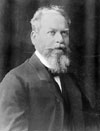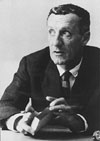TRANSLATE THIS ARTICLE
Integral World: Exploring Theories of Everything
An independent forum for a critical discussion of the integral philosophy of Ken Wilber
 Wendelin Kuepers Wendelin Kuepers is Professor Professor of Leadership and Organization Studies
at Karlshochschule International University, Germany. His phenomenological and cross-disciplinary research contributes to the 'embodied turn' in social science and in organisation and management studies. It identifies parameters, cutting-edge issues, processes and effects of embodiment, and emotion in relation to organisational and managerial phenomena. Moreover, the research aims at developing concepts for a re-integration of bodily and emotional dimensions and thereby enhances life in organisations. Specifically, the advanced phenomenology of Merleau-Ponty is used for advancing the discourses in organisation and management science theoretically and methodologically. He can be contacted at : [email protected] Phenomenology and Integral Theory
Or Why Phenomenology is More and Different
than an "Upper Left" or "Zone #1" Affair
Wendelin Kuepers
Abstract:
 Edmund Husserl Edmund HusserlIt will be proposed that advanced phenomenology provides the foundations for an "adequate phenomenology" in integral research.
This contribution investigates the status of phenomenology in integral theory. In particular it will problematise the classification of life-worldly phenomenology as a discipline located only in the interior upper-left quadrant or as a Zone 1 perspective in Wilber's integral model and methodology.
Based on main ideas of classical (Husserlian) phenomenology and its various critiques and further developments, the treatment in integral (AQAL) theory is discussed critically. Especially the ordering of phenomenology into a separate field or zone, the status of consciousness, including the debate related to its structure and states, and inter-subjective dimensions as well as the relation to contemplation and meditation are examined systematically.
 Maurice Maurice
Merleau-PontyFurthermore, then with regard to the more advanced form of phenomenology as developed by Merleau-Ponty its proto-integral potential will be outlined. It will be argued that activating this potential may contributes to correct some of the weaknesses and limitations of conventional integral theory.
Moreover, it will be proposed that advanced phenomenology provides the foundations for an "adequate phenomenology" in integral research. As part of this more adequate phenomenology and its ontological, epistemological, and methodological dimension some perspectives on what is called integral "pheno-practice" will be offered.
All in all, it is hoped that the critical exploration of phenomenology in its more proto-integral, adequate and pheno-practical forms might enrich integral research, improve its theory building and empirical testing by offering a more inclusive, coherent approach as part of an overarching holarchical ecology of integrative knowledge and practice
Read the full essay "Phenomenology and Integral Theory (58 pages, PDF)...
|
 Wendelin Kuepers is Professor Professor of Leadership and Organization Studies
at Karlshochschule International University, Germany. His phenomenological and cross-disciplinary research contributes to the 'embodied turn' in social science and in organisation and management studies. It identifies parameters, cutting-edge issues, processes and effects of embodiment, and emotion in relation to organisational and managerial phenomena. Moreover, the research aims at developing concepts for a re-integration of bodily and emotional dimensions and thereby enhances life in organisations. Specifically, the advanced phenomenology of Merleau-Ponty is used for advancing the discourses in organisation and management science theoretically and methodologically. He can be contacted at : [email protected]
Wendelin Kuepers is Professor Professor of Leadership and Organization Studies
at Karlshochschule International University, Germany. His phenomenological and cross-disciplinary research contributes to the 'embodied turn' in social science and in organisation and management studies. It identifies parameters, cutting-edge issues, processes and effects of embodiment, and emotion in relation to organisational and managerial phenomena. Moreover, the research aims at developing concepts for a re-integration of bodily and emotional dimensions and thereby enhances life in organisations. Specifically, the advanced phenomenology of Merleau-Ponty is used for advancing the discourses in organisation and management science theoretically and methodologically. He can be contacted at : [email protected] 

